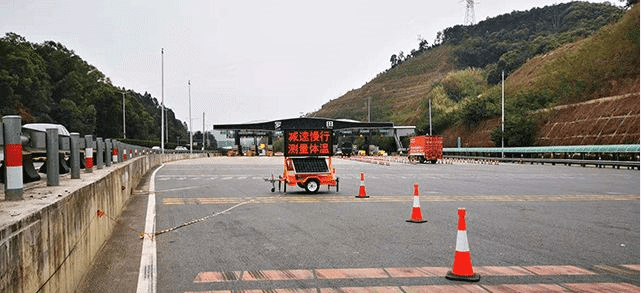Doing business and becoming a successful entrepreneur never happens without a challenge. You need to be flexible, creative and change your route when the situation so requires. We ask our community of mobility entrepreneurs how they adapted their actions in Rerouted.
Shenzhen Yaham Optoelectronics Co. Ltd. is located in Bao'an District, Shenzhen, Guangdong Province, with a R&D and production site of 40,000 square meters. Since its establishment in 2002, the company has been focusing on LED display, the overall solution design of LED traffic and lighting engineering, production and engineering installation services. With LED traffic and lighting engineering the company provides global market customers with industry-leading integrated solutions for mid to high-end LED display applications.
The company's business scope is not only spread across the country, but also exported to developed countries and regions such as Europe, America, Southeast Asia, Asia, and Australia. As for a lot of companies, the outbreak of COVID-19 has asked for a different route. As Marketing Specialist Luna Chen has since 2017 been responsible for the company's overseas market exhibition and promotion work, and on the other hand, doing industry market research and data analysis is amongst her daily work. We asked Luna Chen, how the company had to reroute.
Intertraffic:
How did this outbreak affect your business?
‘Affected by the pandemic, the optoelectronics industry market has slowed down, especially overseas markets have been affected. When COVID-19 broke out overseas major countries and regions adopted measures such as home isolation, suspension of work and production, and traffic control. Large-scale projects have been put on hold and delayed, and orders have decreased. Affected by this, overseas supply chains were interrupted and market demand declined.’
‘Not only did overseas orders decrease due to COVID-19, the general impact of trade frictions between US and China affected it too. Overseas customers are all on the side-lines. It is not that people do not want our products less than before. The acceptance and market potential of our products are still quite huge.’
Intertraffic:
How did you survive?
‘The company started to generate revenue through new channels. Through sales promotion activities, the company sold the backlog of goods and products which were exhibited in previous years at a discount and facilitated number of orders. On the other hand, financially, we adopted a financial policy of "increasing revenue and reducing expenditure" to strictly control the costs and expenditures of personnel, materials, capital, and reduce all non-core material or R&D costs. By reducing all non-core office costs, such as departmental team building expenses we can enable the company to have sufficient funds to invest in its core business operations and ensure the company's healthy cash flow.’
‘In addition, the company also actively applied for government financial support subsidies. Since the outbreak of the pandemic, government has successively introduced a series of policies and measures to stabilize foreign trade, including unprecedented tax and fee reduction policies and increase in the export tax rebate rate of some products. The company’s financial management team actively pays attention to relevant financial support policies, reach out for subsidies and receive the benefit of relevant tax reduction policies.’
‘We actively applied for government subsidies. Small and medium-sized private enterprises, especially foreign trade ones, are mainly affected by the pandemic. Therefore, the Chinese government has focused on introducing a series of fiscal policies to help these enterprises overcome the difficulties. Mainly through lowering the tariff, providing loan, and granting subsidies to help quickly restore production capacity.’
‘Here is an example: due to the pandemic, some foreign trade companies in Shenzhen have failed to deliver products to overseas customers on time, facing problems such as inability to perform contracts and bearing huge economic losses. According to the China Council for the Promotion of International Trade (CCPIT), companies that are unable to perform international trade contracts or unable to carry out on time due to COVID-19, can apply for a Force Majeure certificate. After issuance, the parties can be partially or completely exempted from non-performance, incomplete performance and delay in performance of the contract. In this regard, the Shenzhen Municipal Committee for the Promotion of International Trade recently handled the first batch of Force Majeure certificates for COVID-19 in Shenzhen for 11 companies.’
‘We took another important route. Before the outbreak, when the overseas market was good, the overseas market could account for up to 70% of our business income. In the first half of 2020 business income in overseas markets accounted for 66%, and business income in domestic markets accounted for 33%. Overseas market revenue after the outbreak has not changed much compared to before the outbreak. This shows that the potential of overseas markets is still huge, but due to the impact of the pandemic, it is lower than our expected data. While overseas is still in the outbreak stage plus we face China-US trade frictions and other complex political situations, in contrast, the domestic pandemic has basically ended and the economy is moving towards full recovery. In consideration of the fundamental aspects of maintaining the steady development of the company during the pandemic period, the company adjusted its main business operation strategy temporarily and shifted our sales focus to the domestic market. We increased funding, resources in R&D field and sales (labour)force to the domestic market. The company is working hard in the national hotspot industry sector, focusing on domestic high-quality projects and major engineering projects, and continuing to enlarge the company's superiority in LED display engineering projects by undertaking domestic large-scale engineering and infrastructure projects.'
'Even though the company adjusted the operational strategy ideas of the business segment and temporarily shifted its sales focus to the domestic market, this does not mean that the company has changed its long-term development strategy for overseas markets. From the perspective of long-term and stable development, the company still regards the expansion of overseas markets as an important development direction. 18 years of the blueprint for developing overseas markets and the accumulated dominance overseas is still the company's most important competitiveness.’
Intertraffic:
Has your day changed?
‘Yes, days have changed. Since the outbreak of the pandemic, the number of outings to socialize and travel has decreased significantly. This year, the number of trips abroad for work and travel is zero, and the radius of work and life activities is limited to China, and even to Shenzhen.’
Intertraffic:
Did the outbreak result in new opportunities or smart solutions?
‘The COVID-19 has also shown us potential market opportunities. During the pandemic, the company independently developed new LED traffic display products with pandemic prevention and control functions. The company's mobile trailer screen played a significant and active role in the prevention and control of the Shenzhen Expressway.’

‘The mobile trailer screen developed by the LED traffic display team can be applied to the traffic information broadcast system in highways, parking lots and other areas. Because of its convenient mobility, the company trailer screen not only provides drivers with effective pandemic prevention information and traffic information; it can also display instructions, notices and related road prevention and control information from the command and dispatch department, so as to effectively control traffic, to induce and improve the transportation capacity of roads.’
Intertraffic:
What do you see in long run?
‘Recent research showed the global light-emitting diode (LED) traffic signs and signals market has the potential to grow by USD 356.63 million between 2020-2024. This is a significant market slow down compared to the 2019 estimates due to the impact of COVID-19 in the first half of 2020, but healthy growth is expected to continue at a CAGR of over 8%.
‘We rely on investments in road infrastructure. Luckily, many countries across the world are focusing on the improvement of road infrastructure to allow the expansion of business and provide easy access to markets and suppliers. We remain quite positive about the future.’
‘At the same time this outbreak has made us more aware of any crisis management. We can no longer rely solely on the overseas market. If we would do so, it may have a great adverse effect on the company. I would advise enterprises to think of developing market variety and diversification so that market risks can be avoided to the greatest extent when something like this happens in the future.’







